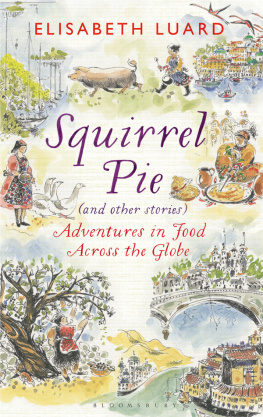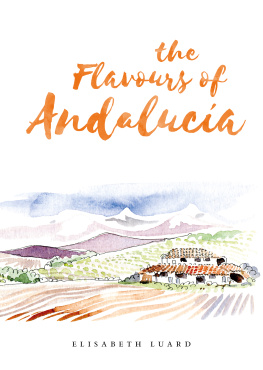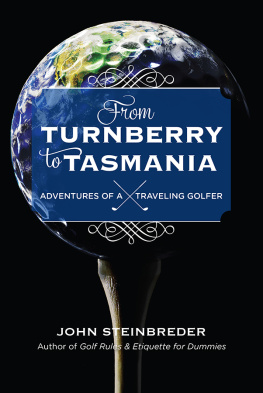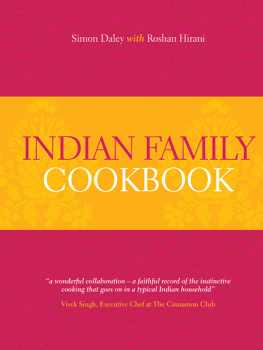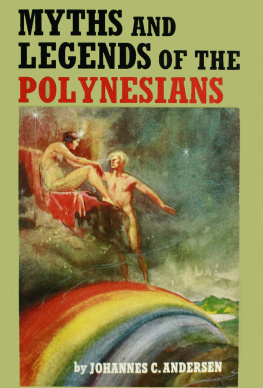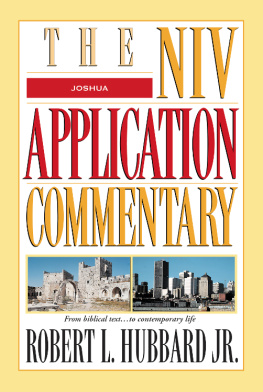SQUIRREL PIE
Elisabeth Luard

For my grandchildren, Jessie, Bonnie, Harper, Iona, Orin, Sophie and Plum, who will inherit the care of our beautiful planet
CONTENTS
Preface
AS A FOOD WRITER BY TRADE AND TRAVELLER whenever I get the chance, my interest lies in how and why and what the rest of the world prepares its daily dinner. While its possible to eat chips and caviar anywhere on the planet Adelaide, Rome, Mumbai or San Francisco what we cook at home, the dishes whose ingredients and method have their origin in necessity, remains remarkably regional, particularly when we come together to celebrate a festival or mark a rite of passage.
The composition of the dishes we cook to remind ourselves of who we are is dictated by climate, geography, latitude and trade routes. Of these four determining factors, the most powerful is geography. The divisions in this book reflect that islanders share a way of life with other islanders, river-dwellers live like other river-dwellers, foresters have much in common with their fellow foresters, desert-dwellers live like other desert-dwellers.
Few of us still live as our ancestors did. Fewer still would want to. And yet whats on sale in the marketplace any marketplace tells a different story, whether a few stalls heaped with wild gathered leaves and roots by a roadside on the shores of Lake Tana in the Ethiopian Highlands, or the gastronomic splendours of the central market in Lyon in southern France, for most of the world, the daily dinner begins with whatevers in season and fresh but above all familiar.
I came late to the tourist trail. Travel was never a possibility in the early years of family life, when four children needed me at home. Later, when my responsibilities as wife and mother had lightened, I seized every opportunity to take to the road. Journalists go wherever theyre sent usually in the low season, when life in whatever tourist destination is on the official list has returned to normal, whether this is a spa hotel on a paradise island in the Hawaiian archipelago or a bed-and-breakfast in a mud hut in the Great Rann of Kutch. Notes of my experiences along the way as well as a lifetime spent poking around in other peoples cooking pots provided the raw material for the stories in this book. The recipes included at the end of each chapter are those borrowed or begged on my travels. The drawings I was a natural history artist before I ever wrote a recipe are derived from the watercolours in my sketchbooks.
As a child, I was no stranger to faraway places. Early schooldays were spent in Montevideo, capital of Uruguay, a dozy harbour port on the River Plate. My brother and I were stepchildren, leftovers from a wartime marriage brought to an untimely end in the icy waters of the Atlantic in World War II. Our mother remarried a diplomat on the Latin American circuit and employed cooks and maids to run the household. Left more or less to our own devices after school, we would join our schoolmates on the quayside to catch bony little flatfish for our mothers cook to fry for our supper. Children are valued and spoiled among the Latins and language was no problem. I already spoke French, the diplomatic language, and Spanish easily followed. The kitchen, with its bubbling cooking pots and delicious scents of garlic and herbs, quickly became my refuge. Sometimes, I was even allowed to go home with one of the young maids at the weekend. Her mother cooked thick bean stews fiery with chilli and I fell asleep on an old bus-seat with never a thought for my own soft bed. By the time I was dispatched to a dismal English boarding school to finish my erratic education, I already understood if only by instinct that home is a state of mind, portable as a penknife, the most useful item in a childs pocket, and just as likely to be lost.
Married at twenty-one and a mother soon after, I had little time to enjoy the freedoms of a young woman in London in the newly liberated sixties, let alone establish a career for which I was, in any event, equipped with little more than secretarial skills and a year or two at art college. Life with husband Nicholas at the time of our marriage, proprietor of Private Eye and owner, with his friend Peter Cook, of a satirical nightclub in Soho was never likely to be easy. And so it proved when the breadwinner of the family took up a new career as a novelist.
Writing is an uncertain business, and money was always short. So I uprooted husband and family to spend the early school years in a remote valley in Andalusia in southern Spain, among the Latins in a place where I felt at home. There was a chance, too, to augment the family income by selling my work as a natural history artist in the new tourist boutiques opening further up the coast.
There was much to be learned from the self-sufficient farming community in the valley, and my neighbours, taking pity on the ignorance of a vulnerable young mother whose saving grace was fluent Spanish, took it upon themselves to instruct me in the household essentials. How was it that a mother responsible for four small children had never learned how to salt down the meat of the household pig? Had my own mother taught me nothing? I soon learned how to slaughter and skin a rabbit for the Sunday paella and soothe my childrens sniffles with snail broth flavoured with pennyroyal. As a matter of urgency, a sty-pig was installed in a stone-walled enclosure behind the house, and an elderly donkey provided to carry the children to the local school.
Memories of civil war and the brutal dictatorship that followed made the valley-dwellers wary of change. Self-sufficiency, the product of back breaking labour and a willingness to endure hardship, delivered a measure of independence. Most of the necessities of life were available without charge. Every household milked two or three goats and made their own cheese, kept chickens for eggs and meat, fattened up a sty-pig on the kitchen leftovers, grew enough vegetables to see them through the summer and dried their own pulses to carry them through the winter. One or two households ground their own grain in the mill by the stream and baked their own bread, while the forested upper slopes provided a little money from the sale of the cork bark stripped from the cork oaks every seven years, fodder for semi-wild herds of Iberico pigs and charcoal for cooking fires.
When change came, the pace was rapid. With the dictatorship replaced by democracy, the young moved to the towns for wages and only the old folks were left in the whitewashed farmsteads to milk the goats and prepare the cheese with rennet from the stomach of a newborn kid. By the time we left our life in the valley, knowledge that sustained an ancient way of life was already vanishing as fast as snow in summer.
The valley-dwellers had good reason to abandon the old ways. Few, given a choice, would want or even be capable of such a life, romantic though it may seem. To those of us fortunate enough to live in a world of plenty, it might seem unnecessary even archaic to look beyond the narrow confines of science and nutrition and take account of the diet of necessity. And yet if we abandon the ancestral hearth-fire, forget what our forefathers learned over the millennia, we deprive ourselves of a store of knowledge we can ill afford to lose.
Introduction
ANYONE HERE EXPERIENCED KANGAROO?
Vic Cherikoff, huntsman, TV chef and rugged frontman for the bush-tucker craze sweeping Australia like a flashfire through a eucalyptus grove, inspects his sell-out audience through narrowed eyes. The scent of raw meat and fear hangs in the air.

